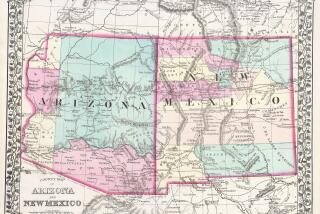Files From Roberts’ Reagan Years Are Released
As a young lawyer for President Reagan, John G. Roberts Jr. argued strongly that the White House should keep its internal files secret and refuse to release them to the Senate to win confirmation for a presidential nominee to a senior government post.
“We should take whatever steps are necessary to ensure the general opening of files to Hill scrutiny ... does not become routine,” Roberts said. “I would hope that ... we would be in a better position to resist committee demands.” He also denounced as “pernicious” the Presidential Records Act of 1978, in which Congress called for the future public release of files housed in a president’s library.
“By 2001,” Roberts wrote with alarm on Aug. 29, 1985, “Hill staffers need only go to the Reagan Library to see any internal White House deliberative document they want to see.”
This memo by Roberts, whom President Bush has nominated to the Supreme Court, appears among 5,300 pages of White House files released Monday by the Ronald Reagan Presidential Library, as young Roberts had predicted.
Among the documents were one that indicated Roberts’ support for prayer in public schools and his support for the antiabortion movement.
The bulk of the files released Monday contained neither the writings nor the views of Roberts. Instead, they consisted of court opinions, speeches, letters and memos written by others and collected in files held by Roberts while he served in the White House counsel’s office, beginning in 1982, when he was 27. He left four years later to join a Washington law firm.
In addition to winnowing the files released thus far, the Bush White House has refused to release many of the internal files covering Roberts’ later service in the Justice Department under President George H.W. Bush. Those files are sought by Senate Democrats. In particular, files from Roberts’ time as the top political deputy to U.S. Solicitor General Kenneth W. Starr are off-limits, the White House has said.
The Bush White House also appeared to follow Roberts’ advice in moving to control the release of files from the Reagan Library.
In his 1985 memo, Roberts said the “pernicious effect of [the Presidential Records Act] will have to be addressed in any effort to revitalize the deliberative privilege.” The “deliberative privilege” refers to the idea that the debate and deliberation within the White House will be crimped if the president’s advisors believe their comments and memos will be released to the public in the future.
Shortly after taking office, Bush issued an executive order asserting that the “incumbent president” must review and approve files before they were released from the libraries of former presidents, including those of Ronald Reagan and George H.W. Bush. The order said the current president could block the release of files based on his “constitutionally based privileges.”
In recent weeks, two White House lawyers were dispatched to review the Roberts files held at the Reagan Library near Simi Valley.
The Reagan Library said it had more than 50,000 pages of records that related to Roberts. In a statement issued Monday, the National Archives and Records Administration said it was releasing 5,393 pages of Roberts files in response to requests from Senate Democrats. It also said 478 pages were withheld by the archivist and the Reagan Library.
The law permits files to be withheld for a variety of reasons, including concerns for national security or the privacy of people mentioned in the files.
A spokeswoman for the archivist said Monday that 459 of the 478 withheld pages were not released because of privacy concerns under the federal Freedom of Information Act. The other 19 pages were withheld under three other exemptions to the act.
One glimpse into Roberts’ personal views on the issue of school prayer is contained in a 1985 memo in which he objected to a Supreme Court ruling that struck down an Alabama law mandating a daily moment of silent prayer in schools.
Two decades before, the high court had banned state-sponsored prayers and Bible readings in public schools. Roberts and other Reagan lawyers were upset that the justices refused -- in a case called Jaffe vs. Wallace -- to relax this ban so that states could begin the school day with a “voluntary” or “silent prayer.”
“The conclusion in Jaffe vs. Wallace that the Constitution prohibits such a moment of silent reflection -- or even silent ‘prayer’ -- seems indefensible,” he said.
Alabama’s lawmakers, hoping to restore daily prayers to the schools, had enacted a law that said teachers must begin each day with a one-minute period “for meditation or voluntary prayer.” But the high court, in a 6-3 decision, struck down the law because state officials were intent on restoring voluntary prayers to the schools.
In a concurring opinion, Justice Sandra Day O’Connor, whom Roberts has been nominated to succeed, drew a fine line.
She said students were certainly free to engage in voluntary prayer on their own. Moreover, states could require a “moment of silence.” But she also agreed that state lawmakers crossed the line when they told teachers to set aside a daily moment for “voluntary prayer.”
Roberts wrote a memo a few months later saying he disagreed with the decision. The White House should back moves in Congress to restore voluntary prayer in the schools, he said, either through a constitutional amendment or by removing the court’s jurisdiction over this issue.
In another memo, from Oct. 4, 1985, Roberts approved a proposed telegram for Reagan to send to a memorial service for 16,500 aborted fetuses that had been discovered in Los Angeles. The draft telegram compared Roe vs. Wade to the Dred Scott decision of 1857, which upheld slavery.
Roberts made no objection to the language. He said he thought a memorial service for the fetuses would be “entirely appropriate.”
Supporters of the Roberts’ nomination said the files showed him to be true conservative.
“The documents released today show that as a White House lawyer John Roberts was a forceful proponent of Reagan administration policies on abortion, school prayer, criminal justice and other hotly contested issues. Those who try to paint Judge Roberts as a squishy moderate will not find any supporting evidence in these documents,” said Ed Whelan, president of the Ethics and Public Policy Center in Washington and a former clerk to Justice Antonin Scalia.
Besides the Alabama school prayer case, Whelan pointed to Roberts’ memo in the memorial service for fetuses and to a Jan. 4, 1983, memo questioning the “exclusionary rule” for criminal evidence. This rule requires that if the police violate a suspect’s rights in obtaining evidence, it must be excluded from trial.
In this instance, Roberts was reacting to a December 1982 story in the Los Angeles Herald Examiner about a National Institute of Justice report that said the exclusionary rule had resulted in the release of 29% of felony drug arrestees in Los Angeles in one year. Roberts described the 29% as a “far cry from the highly misleading 0.4% usually bandied about.” He said the study should be “highly useful in the campaign to amend or abolish the exclusionary rule.”
In another memo, Roberts criticized the concept of “comparable worth.” In September 1983, U.S. District Judge Jack Tanner found that the state of Washington was violating civil rights laws because it paid higher salaries for state jobs that were held mostly by men, when compared to jobs held mostly by women.
“It is difficult to exaggerate the perniciousness of the ‘comparable worth’ theory,” Roberts wrote in February 1984. “It mandates nothing less than the central planning of the economy by judges. Under the theory judges, not the marketplace, decide how much a particular job is worth, and restructure wage systems to reflect their determination.”
In September 1985, the U.S. 9th Circuit Court of Appeals, in a decision written by future Supreme Court Justice Anthony M. Kennedy, overruled Tanner’s decision. The appeals court said an employer could follow prevailing market wages in setting salaries, even if those wages underpaid women.
*
Savage reported from Washington and Weinstein from Los Angeles. Times staff writer Richard Simon in Washington contributed to this report.
More to Read
Get the L.A. Times Politics newsletter
Deeply reported insights into legislation, politics and policy from Sacramento, Washington and beyond. In your inbox three times per week.
You may occasionally receive promotional content from the Los Angeles Times.







